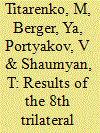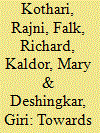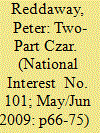|
|
|
Sort Order |
|
|
|
Items / Page
|
|
|
|
|
|
|
| Srl | Item |
| 1 |
ID:
112961


|
|
|
|
|
| Publication |
2012.
|
| Summary/Abstract |
What we observe in Turkey is the emergence of a middle power with an ambitious leader that may sometimes overjudge his own powers, but aiming to enhance the power position of his country during a period of a major world economic crisis and rapidly changing circumstances.
|
|
|
|
|
|
|
|
|
|
|
|
|
|
|
|
| 2 |
ID:
149433


|
|
|
|
|
| Summary/Abstract |
By analyzing Turkey’s relations with Great Britain and the US in a period of drastic change (1929–47), this article argues that the origins of the shift in the orientation of Turkish foreign policy from Pax Britannica to Pax Americana not only affected the perceptions and strategies of relevant powers, but also entailed a dynamic interactive process. It asserts that the transition featured aspects of significant change, as well as continuity for the region. It demonstrates that while attempting to bandwagon with the relatively stronger naval, military, and economic partner, Turkey also endeavored to pursue a more autonomous foreign policy at various stages of this transition.
|
|
|
|
|
|
|
|
|
|
|
|
|
|
|
|
| 3 |
ID:
089600


|
|
|
|
|
| Publication |
2009.
|
| Summary/Abstract |
The relsuts from the latest trilateral meeting of academic political scientists from Russia, China, and India are presented. We examine the scholars approaches to the possibilities of collaboration between the three nations under the conditions for their working together in agriculture and solving the afghan problem
|
|
|
|
|
|
|
|
|
|
|
|
|
|
|
|
| 4 |
ID:
117523


|
|
|
|
|
| Publication |
2012.
|
| Summary/Abstract |
The 2008-2009 global economic crisis has revived debates concerning the decline of American hegemony and the rise of China. This article engages with these debates on two levels. First, through situating the 2008-2009 crisis in longer-term development trends in the world economy, I suggest that the empirical evidence of American decline is more ambiguous and that the crisis itself is not, necessarily, an indicator of decline, but rather an organic feature of uneven development with more open political consequences. Secondly, I offer a revised neo-Gramscian perspective on American hegemony by highlighting the contradictions between the structural logic of uneven development and the neoliberal historical bloc. Through this I provide an alternative overview of the evolution of American hegemony over the last 30 years pointing to the likely continuation of American/neoliberal global hegemony.
|
|
|
|
|
|
|
|
|
|
|
|
|
|
|
|
| 5 |
ID:
030220


|
|
|
|
|
| Publication |
Tokyo, United Nations University, 1989.
|
| Description |
v, 167p.
|
| Standard Number |
8185296006
|
|
|
|
|
|
|
|
|
|
|
|
Copies: C:1/I:0,R:0,Q:0
Circulation
| Accession# | Call# | Current Location | Status | Policy | Location |
| 032739 | 327.172/KOT 032739 | Main | On Shelf | General | |
|
|
|
|
| 6 |
ID:
087948


|
|
|
|
|
| Publication |
2009.
|
| Summary/Abstract |
THE WORLD'S economic crisis may have profound political effects in many countries over the next year or two, but it certainly won't cause President Obama to leave office early. The same cannot be said with any certainty about President Medvedev or Prime Minister Putin of Russia. Indeed, the system of dual-executive leadership that they operate is the subject of continuous debate and increasing anxiety on the part of Russian elite groups. Some observers fear that the tandem system is becoming unstable, is undermining the cohesion of the state and-in particular-may not be able to handle the deepening recession. They are apprehensive that the two men could, before too long, lose the public trust that they now enjoy, which is a crucial linchpin holding a fragile state and society together. This in turn could cause dangerous convulsions over who should lead the country.
These observers, from academe to think tanks to business circles, see the tandem system as unnatural, first because the executive branch has only rarely in Russian history been divided. On those occasions, as in 1917 after the fall of the monarchy and in the early 1990s when Gorbachev and Yeltsin competed, the division was short-lived. Second, the history of the present arrangement, launched in December 2007, has been bizarre. Toward the end of his presidency, Vladimir Putin rejected calls to change the constitution and run for office again. Instead, he anointed a protégé, the politically weak Dmitri Medvedev, to succeed him as president. Then he had Medvedev appoint him to what was, formally, the politically inferior position of prime minister.
|
|
|
|
|
|
|
|
|
|
|
|
|
|
|
|
| 7 |
ID:
117371


|
|
|
|
|
| Publication |
2012.
|
| Summary/Abstract |
International Affairs: We met with you more than one year ago. What is your assessment of the results of UNESCO activities since that time?
E. Mitrofanova: 2011 was a year of challenges posed to the whole world and UNESCO. Global changes were rapid and irregular, and international relations once again were following a bumpy path.
The activities of the Organization, as those of other international agencies, were taking place against the backdrop of ongoing world economic crisis, conflicts in various regions and serious natural disasters which called for extraordinary efforts on the part of UN member states and the entire UN system. At the same time, UNESCO preserved its status of the international platform with the biggest number of countries represented in it-195.
|
|
|
|
|
|
|
|
|
|
|
|
|
|
|
|
| 8 |
ID:
090052


|
|
|
|
|
| Publication |
2009.
|
| Summary/Abstract |
The transfer of money and other liquid assets was backed by guarantees of variable-value capital assets where risks were determined privately by private commercial banks. This means that the international circulation of financial assets became virtually privatized and transactions involving them were brought into the civil circulation. It should be noted that the main flows of finance in the latter part of the 20th century were determined by government credits and investments. Thus, it's not only a revolution in financial techniques but also in the legal regime of these transactions.
|
|
|
|
|
|
|
|
|
|
|
|
|
|
|
|
| 9 |
ID:
094354


|
|
|
|
|
|
|
|